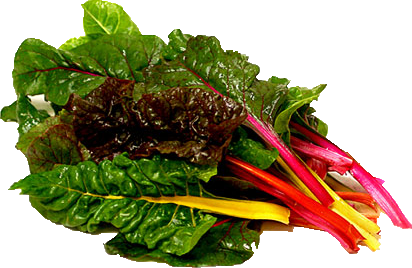|
Swiss chard, like
spinach, is the store-house of many phytonutrients that have health promotional
and disease prevention properties.
Chard is very low
in calories (19 kcal per 100 g fresh, raw leaves) and fats, recommended in
cholesterol controlling and weight reduction programs.
Chard leaves are
an excellent source of antioxidant vitamin, vitamin-C. Its fresh leaves provide
about 33% of recommended levels per 100 g. As a powerful water-soluble
antioxidant, vitamin C helps to quench free radicals and reactive oxygen
species (ROS) through its reduction potential properties. Research studies
suggest that regular consumption of foods rich in vitamin C help maintain
normal connective tissue, prevent iron deficiency, and also help the human body
develop resistance against infectious agents by boosting immunity.
Chard is one of
the excellent vegetable sources for vitamin-K; 100 g provides about 700% of
recommended intake. Vitamin K has potential role bone health by promoting
osteotrophic (bone formation and strengthening) activity. Adequate vitamin-K
levels in the diet help limiting neuronal damage in the brain; thus, has
established role in the treatment of patients suffering from Alzheimer's
disease.
It is also rich
source of omega-3 fatty acids; vitamin-A, and flavonoids anti-oxidants like
ß-carotene, α-carotene, lutein and zeaxanthin. Carotenes convert to vitamin A
inside the body.
It is also rich in
B-complex group of vitamins such as folates, niacin, vitamin B-6 (pyridoxine),
thiamin and pantothenic acid that are essential for optimum cellular metabolic
functions.
It is also rich
source of minerals like copper, calcium, sodium, potassium, iron, manganese and
phosphorus. Potassium is an important component of cell and body fluids that
helps controlling heart rate and blood pressure by countering effects of
sodium. Manganese is used by the body as a co-factor for the antioxidant
enzyme, superoxide dismutase. Iron is required for cellular oxidation and red
blood cell formation.
Regular inclusion
of chard in the diet has been found to prevent osteoporosis, iron-deficiency anaemia,
and vitamin-A deficiency; and believed to protect from cardiovascular diseases
and colon and prostate cancers.
Manage Diabetes: Perhaps one of the most important benefits of Swiss chard is its
ability to regulate the blood sugar levels in our body. Syringic acid is one of
the unique flavonoids found in Swiss chard, and it has a very unusual ability.
It inhibits the activity of a specific enzyme named alpha-glucosidase. This
means that less cards are broken down to simple sugars, which allows the blood
sugar levels in the body to remain stable, and prevent the plunges and peaks that
are so dangerous for diabetic patients, or for those people who are at a high
risk of developing diabetes.
Cancer Prevention: Like many leafy, green vegetables, Swiss chard has anti-cancer
properties due to the huge amounts of antioxidants found in it. Antioxidants
neutralize free radicals, which are the dangerous by-products of cellular
metabolism that can cause healthy cells to become cancerous. Swiss chard
contains significant amounts of vitamin E, C, zinc, lutein, zeaxanthin,
kaempferol, beta-carotene, and quercetin. Many of these have been connected to
preventing a wide variety of cancers, specifically colon cancer.
Bone Health: Swiss chard has a significant amount of calcium in those leaves,
which means that Swiss chard is a major boost for bone health. Calcium, as well
as the other minerals found in this vegetable help to stimulate bone growth and
development, including magnesium and vitamin K.
Brain Booster: Swiss chard is a valuable source of both potassium and vitamin
K, both of which are found in significant amounts in the brain, and are
integral parts of boosting cognitive development and abilities. Add some Swiss
chard to your diet and expand your mind!
Blood Circulation: Iron and copper are both essential elements of red blood cells,
and without those two minerals, people can develop anaemia, which shows itself
as weakness, fatigue, stomach disorders, and lack of concentration. By ensuring
a proper amount of red blood cells by eating food like Swiss chard, you can
increase circulation of the blood and oxygenation of essential organs within
the body.
Blood Pressure and
Heart Health: The anti-inflammatory and phytonutrient
antioxidants found in Swiss chard, along with potassium, all contribute to
reducing blood pressure and stress on the cardiovascular system. Some
hypertension is due to pro-inflammatory enzymes within the body, which the
organic compounds in Swiss chard are able to neutralize. Therefore, Swiss chard
protects those who eat it from a variety of conditions like atherosclerosis,
heart attacks and strokes.
Eye Health: Swiss chard has a huge amount of beta-carotene, which has been
linked in many ways to optimal eye health and a reduction in macular
degeneration, glaucoma, night blindness, and other vision-related conditions.
Hair Health: Biotin is an organic compound that has been directly linked to
healthy hair, the stimulation of follicles, and as a way to increase lustre and
texture. Swiss chard also has significant amounts of biotin, among its many
other beneficial compounds.
|

